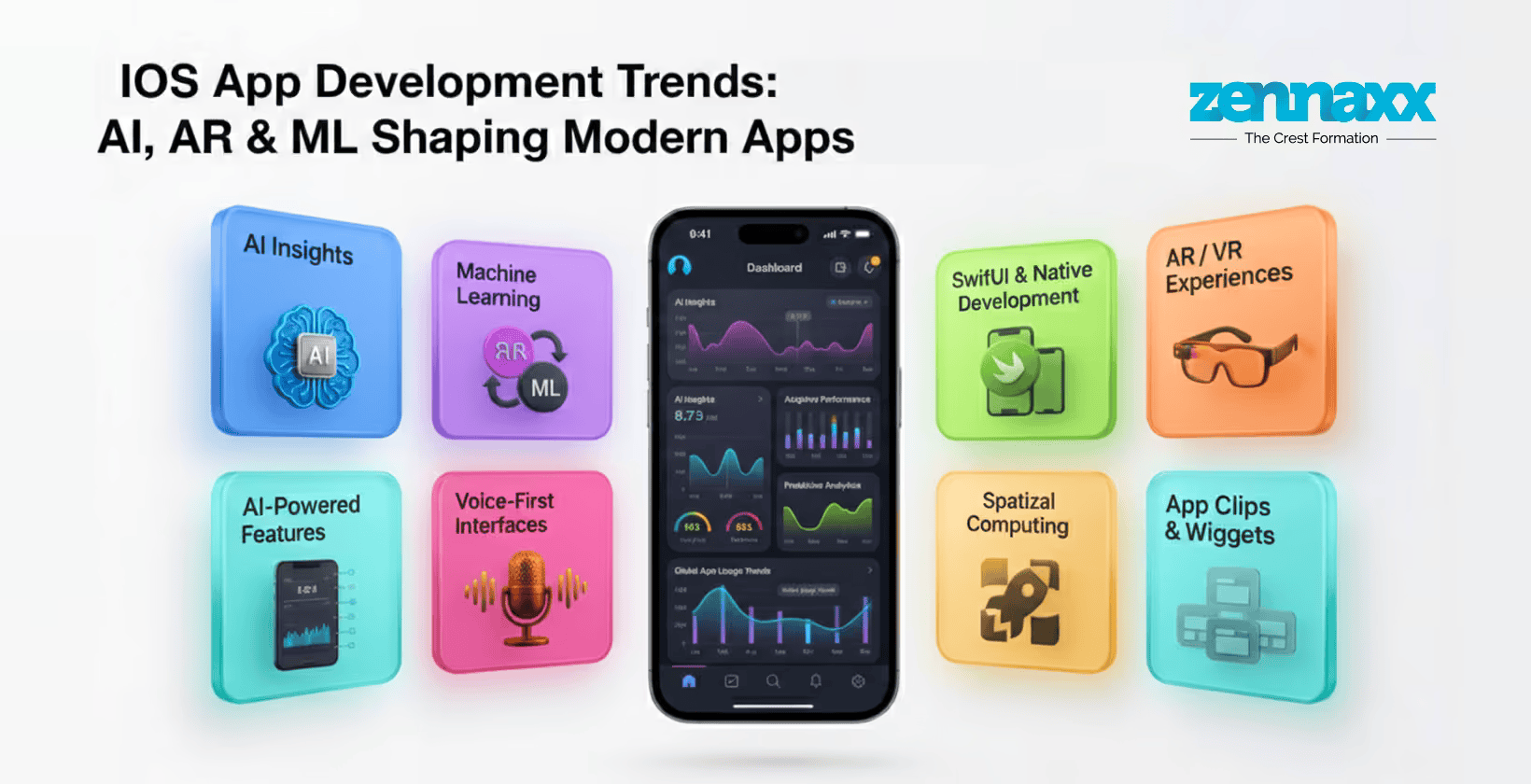Mobile app development is the process of designing and building software applications that operate on smartphones and tablets using platform-specific technologies (iOS, Android) or cross-platform tools. Mobile apps are developed to deliver specific functionalities directly on user devices, supporting system-level interactions, native UI rendering, and device-specific capabilities such as camera, GPS, and offline storage.
The mobile applications development process integrates front-end design, backend infrastructure, and platform-specific deployment workflows to produce scalable and high-performing applications. The mobile application development process includes strategy planning, technical architecture, UI/UX design, backend development, service integration, quality testing, launch preparation, release execution, and lifecycle management.
The mobile app development lifecycle is a structured end-to-end process that transforms an idea into a fully deployed mobile application through iterative planning, engineering, and optimization stages. The mobile app development lifecycle includes strategy planning, technical architecture, UI/UX design, backend development, app component building, quality testing, and lifecycle management.
The mobile app development cost ranges from $5,000 for simple apps to over $500,000 for complex solutions involving real-time sync, AI, or AR. The core tools used in mobile app development include programming languages (Swift, Kotlin, Java, Dart), frameworks (Flutter, React Native, Xamarin, Jetpack Compose), and IDEs (Android Studio, Xcode, Visual Studio Code).
What is Mobile Application Development?
Mobile application development is the process of designing, programming, testing, and deploying software applications for portable devices (smartphones and tablets) using operating systems (iOS, Android) or cross-platform frameworks (Flutter, React Native, Xamarin). The purpose of mobile application development is to deliver interactive, responsive, and accessible digital services to users through downloadable apps available on platforms (Apple App Store or Google Play). Custom mobile application development addresses specific business workflows, user roles, and data structures by building applications from scratch using selected programming languages and frameworks. Custom mobile app development approach ensures control over performance, scalability, and backend architecture. Companies often rely on a mobile app development company to manage the architectural planning, implementation, and scaling of these custom solutions.
The Steps in the mobile app development process are listed below.
- Planning Application Strategy (goal definition, user profiling, market analysis)
- Establishing Technical Architecture (tech stack, scalability planning, compliance design)
- Designing User Experience and UI (wireframes, interactive prototypes, visual design systems)
- Developing Backend Infrastructure (server logic, database integration, authentication systems)
- Building Application Components (frontend interface, APIs, data handling modules)
- Integrating External Services (payment systems, analytics, social login, maps)
- Testing Application Quality (UI testing, performance testing, penetration testing)
- Preparing Market Launch (metadata setup, store compliance, onboarding experience)
- Executing Application Release (app store deployment, crash monitoring, feedback loops)
- Managing Application Lifecycle (updates, feature scaling, long-term maintenance)
1. Planning Application Strategy
Planning application strategy in mobile application development defines the foundational roadmap for how the mobile application will align with business goals, target users, and platform-specific requirements. A planning application strategy outlines the entire mobile application development process, creating clarity across engineering, product, and marketing teams. Planning application strategy in mobile application development involves stakeholder alignment workshops, competitive feature analysis, user persona mapping, and selecting a monetization model.
The planning application strategy is executed by conducting structured interviews with product owners, prioritizing use cases using the MoSCoW (Must, Should, Could, Won’t) technique, and defining the MVP (Minimum Viable Product) boundaries through backlog shaping. Planning application strategy in mobile application development reduces rework and budget overruns. According to a 2024 Clutch.co industry survey, over 67% of failed app projects lacked clear initial strategy planning. Poor planning in the mobile app development process results in delays of 3–6 months and an over 40% increase in total cost due to scope realignment.
Best practices in planning application strategy include identifying regulatory risks (such as payment gateways requiring PCI-DSS compliance), establishing platform guidelines early (Apple’s Human Interface Guidelines for iOS), and confirming user flow assumptions through moderated testing of clickable prototypes. Examples of planning application strategy include an ed-tech firm prioritizing asynchronous video lessons and a healthcare startup aligning HIPAA (Health Insurance Portability and Accountability Act) rules early to design an audit-compliant backend.
2. Establishing Technical Architecture
Establishing a technical architecture in mobile application development defines the structural and operational framework of the mobile application. Establishing a technical architecture involves understanding how user interface layers, backend infrastructure, databases, APIs, authentication systems, and third-party services interact and scale together. The process of establishing technical architecture in mobile application development includes selecting a system design pattern such as Model-View-Controller (MVC), Model-View-ViewModel (MVVM), or Clean Architecture. The backend infrastructure of mobile app development is defined as either monolithic, microservices-based, or serverless, depending on scalability requirements.
Establishing technical architecture in the mobile app development process improves runtime efficiency, reduces system failures, and prevents long-term technical debt. A 2023 report by McKinsey & Company on digital engineering found that proactive architecture planning reduced downstream rework by up to 40% in enterprise app projects. Poorly designed architectures lead to API failures, versioning issues, or compliance gaps, resulting in delays of 2 to 5 months during post-launch stabilization cycles.
Best practices in establishing a technical architecture for mobile app development include documenting system interactions using C4 model diagrams, utilizing infrastructure-as-code tools (Terraform or AWS CloudFormation), and aligning technology stacks with application goals. Real-time communication platforms benefit from Node.js with MongoDB, while content-heavy apps achieve higher throughput using Laravel with PostgreSQL. Examples of technical architecture in mobile application development include a logistics platform deploying an event-driven microservices architecture to manage driver, merchant, and dispatcher operations independently.
3. Designing User Experience and UI
Designing user experience and UI in mobile application development defines how users will interact with the application across screen flows, gesture inputs, and visual interfaces. Designing user experience and UI in mobile application development ensures usability, accessibility, and engagement across devices, operating systems, and user preferences. The process of designing user experience and UI in mobile application development involves creating user personas, defining user journeys, and building wireframes for each feature module. Designers use tools such as Figma, Adobe XD, and Sketch to create high-fidelity mockups and interactive prototypes. Design systems are implemented using atomic design principles, with a consistent application of typography, spacing, iconography, and color schemes.
Designing user experience and UI impacts engagement, retention, and conversion. A 2024 UXCam benchmark study of 1,200 mobile applications shows that media apps retain 43% of users after 30 days, shopping apps retain 37%, and productivity apps retain 36%, when UI clarity and performance are optimized. Poor user experience results in high uninstall rates, negative reviews, and feature misunderstanding that causes conversion losses ranging from 18% to 40%.
Best practices in designing user experience and UI include starting with mobile-first layouts, validating flows through task-based testing, and simplifying navigation using bottom-tab or hamburger menus, depending on the screen depth. Examples of designing user experience and UI include a food delivery app that simplifies the reorder process to two taps using a card-style repeat feature, and a mental health app that utilizes calming color palettes and micro-interactions to reduce user stress during session check-ins.
4. Developing Backend Infrastructure
Developing backend infrastructure in mobile application development defines data processing, data authentication, business logic, and third-party service integration are handled on the server side. Backend infrastructure enables mobile applications to function dynamically by managing user requests, storing structured information, and ensuring secure communication between the app and remote systems. The process of developing backend infrastructure in mobile application development includes selecting the architecture style (monolithic, microservices-based, or serverless), choosing the programming language and framework (such as Node.js with Express, Laravel with PHP, or Python with Django), and setting up databases (SQL or NoSQL).
Developing backend infrastructure improves mobile app responsiveness and reduces downtime risks during peak usage. According to the 2025 Cloud Mobile Backend-as-a-Service (BaaS) Market Report, apps with optimized backend systems achieve 2.5× better fault tolerance and deliver up to 30% faster API responses.
Best practices for developing backend infrastructure include generating API specifications using OpenAPI, implementing rate limiting to prevent abuse, and using AES-256 encryption in transit with TLS 1.3. Logging and monitoring tools such as ELK Stack (Elasticsearch, Logstash, Kibana) or Datadog are integrated to track errors, latency, and performance metrics in real-time. Examples of developing backend infrastructure in mobile application development include a ride-hailing app using microservices to separate booking, payment, and driver location services. A fitness app uses serverless AWS Lambda for real-time tracking, and a fintech app ensures ISO/IEC 27001 compliance through secure audit logging and access controls.
5. Building Application Components
Building application components in the mobile application development involves constructing the modular units that define the core features and functionalities users interact with. Building application components includes screens, navigation elements, state management modules, and background services that work together to deliver the application’s intended behavior. The process of building application components includes defining reusable UI elements (buttons, lists, forms) using frameworks, implementing screen-level logic using MVVM or Redux patterns, and connecting components to backend endpoints through API handlers.
Well-structured application components enhance user satisfaction, boost performance, and reduce technical debt and UI issues. According to the 2025 Mobile App Experience Index by AppDynamics (Cisco), apps built using modular and testable components reported 33% fewer crashes and 46% faster feature rollout cycles compared to apps with tightly coupled codebases.
Best practices for building application components include writing unit and integration tests per component using tools such as XCTest (iOS) or Espresso (Android), maintaining stateless UI components, and applying atomic design principles to ensure consistency across the interface. Developers enforce component reusability by abstracting logic into hooks, composables, or services, depending on the framework. Examples of building application components in mobile application development include an eCommerce app creating a shared “ProductCard” component used across the homepage, cart, and wishlist sections. A health tracking app utilizes stateful components to manage user metrics (e.g., heart rate, sleep patterns) and displays them using real-time graph components.
6. Integrating External Services
Integrating external services in mobile application development is the process of connecting the mobile app with third-party APIs, SDKs, and platforms to enhance the app’s functionality, reduce development time, and support specialized tools. Integrating external services encompasses payment gateways, authentication providers, analytics platforms, mapping systems, and cloud messaging services. The process of integrating external services in mobile application development begins with selecting stable, well-documented APIs that align with the app’s functional requirements. Developers authenticate APIs using secure tokens (OAuth 2.0 or API keys), implement SDKs for analytics or ads (e.g., Firebase, Google Analytics), and manage dependencies via package managers such as CocoaPods or Gradle.
Integrating external services improves development efficiency and user satisfaction. According to the 2025 Mobile API Performance Report by Postman, mobile applications that depend on optimized third-party integrations achieve up to 42% faster time-to-market and 30% higher user satisfaction ratings, especially in e-commerce, finance, and transportation sectors.
Best practices in integrating external services include validating API uptime and latency using tools such as Postman Monitors, limiting data over-fetching through selective field queries, and securing all transmitted data with HTTPS and encryption standards. Examples of integrating external services in mobile application development include a travel application that integrates the Google Maps API to enable real-time navigation and geolocation. A fintech application that utilizes the Plaid API to fetch transaction data and user account balances securely is an example of interrogating external services.
7. Testing Application Quality
Testing application quality in mobile application development ensures that the mobile application performs reliably, securely, and consistently across devices, operating systems, and user conditions. Testing application quality in mobile application development ensures early detection of functional errors, performance bottlenecks, UI inconsistencies, and security vulnerabilities before deployment. The process of testing application quality involves executing unit tests for business logic, running automated UI tests using tools such as Appium or XCTest, and conducting integration tests to validate complete user journeys.
Testing application quality enhances user satisfaction, reduces maintenance costs, and minimizes post-release bug reports. According to the May 2025 Taglab Mobile UX Study, 62% of users uninstall a mobile app after a single crash or error event. Kobiton’s 2024 State of Testing Report states that over 50% of companies automate less than 25% of their testing pipeline.
Best practices for testing application quality include setting up CI/CD pipelines with automated test runners, such as Jenkins or GitHub Actions, maintaining test coverage above 80%, and simulating user behavior to ensure optimal performance. Examples of testing application quality include a ride-sharing app validating GPS accuracy through 300+ unit tests, a telemedicine app load-tested for 10,000 video sessions, and a banking app using fuzz testing to detect insecure input flows.
8. Preparing Market Launch
Preparing for a market launch in mobile application development defines the coordinated steps taken to introduce the mobile application to the public, ensuring maximum visibility, user acquisition, and platform compliance. The process of preparing for a market launch includes generating signed app builds, completing iOS App Store and Google Play submission checklists, and embedding tracking SDKs. Marketing teams schedule email campaigns, social media posts, and influencer outreach aligned with app availability windows.
Preparing for a market launch has a significant impact on early user traction and visibility. According to the 2024 Mobile App Marketing Index by Business of Apps, apps with coordinated launch campaigns achieved 52% higher Day-1 downloads and 31% better user retention at Day-7 compared to apps with no structured go-live plan.
Best practices for preparing a market launch include performing app store optimization (ASO) with targeted keywords, compressing app size to improve installation conversion rates, and configuring a staged rollout to detect post-deployment issues early. Examples of preparing for a market launch in mobile application development include a fintech app completing Apple notarization and using TestFlight to gather last-mile feedback, and a gaming app achieving 100,000 pre-installs by partnering with gaming YouTubers.
9. Launching and Monitoring the App
Launching and monitoring the app in mobile application development defines how the application is introduced to the target audience and continuously evaluated for stability, usage patterns, and performance post-release. Launching and monitoring the app ensures user engagement, minimizes production errors, and establishes an iterative feedback loop for future updates. The process of launching and monitoring the app in mobile application development involves creating a multi-platform release strategy, setting up pre-launch crash monitoring tools, and configuring CI/CD pipelines to automate build, test, and deployment cycles. Launching and monitoring the app in mobile application development requires integrating analytics SDKs such as Mixpanel or Amplitude to track retention, engagement, session time, and screen flow.
Launching and monitoring the app improves early-stage stability and reduces post-launch churn rates. Taglab reports that 49% of mobile applications are uninstalled within 30 days, with half of those uninstallations occurring on the very first day. The 30-day uninstall rate and first-day drop-off rate highlight the critical role of launch preparation and monitoring in retaining users during the crucial first week.
Best practices for launching and monitoring the app in mobile application development include soft-launching in test markets to validate infrastructure readiness, setting performance budgets (<2 seconds to Interactive), and reviewing console logs. Examples of launching and monitoring include a news platform using phased rollouts to prevent peak-time crashes and a fitness startup validating AWS Lambda scalability through regional launches. A fintech app reduced support tickets by 34% using session replay tools to track user drop-offs during the first 30 days.
10. Maintaining and Updating the Application
Maintaining and updating the application in mobile application development refers to the ongoing process of releasing security patches, performance optimizations, feature enhancements, and compatibility updates after the app is launched. The process of maintaining and updating the mobile application includes scheduled bug fixes, version rollouts using CI/CD pipelines, regression testing before deployment, and monitoring KPIs such as crash rates, load times, and retention curves. Developers use A/B testing to validate UI improvements, automate deployment, and monitor feedback through app store reviews or analytics dashboards, such as Firebase or Mixpanel.
Maintaining and updating the application in mobile application development directly impacts user retention, brand trust, and compliance. According to the 2024 App Annie Retention Report, apps with consistent monthly updates retain users 2.3× better over 6 months compared to apps that skip regular maintenance. Infrequent updates contribute to declining app store ratings, API deprecations, and unpatched vulnerabilities that expose data.
Best practices for maintaining and updating mobile applications include maintaining backward compatibility, updating dependency libraries to mitigate Common Vulnerabilities and Exposures (CVEs), and implementing user feedback loops to guide future updates. Examples of maintaining and updating the mobile application include a social media app releasing weekly updates to patch reported bugs and improve camera performance, and a travel app monitoring OS beta releases to preempt compatibility issues. A banking app improved session stability by 40%-60% through real-time crash analytics and automated rollback during failed deployments.
What are the stages of the mobile app development lifecycle?
The mobile app development lifecycle is a structured process that transforms a concept into a deployed application through seven stages that include Planning, Analysis, Design, Development, Testing, Deployment, and Maintenance.
Listed below are the 7 stages of the mobile app development lifecycle.
- Planning and Strategy: Planning and strategy in mobile app development is the first phase where the app’s core objectives, user roles, and revenue goals are defined and documented. The planning and strategy phase includes drafting the Product Requirements Document (PRD), identifying target personas, and aligning KPIs with monetization pathways. According to the 2024 App Development Lifecycle Report by GoodFirms, 69% of successful apps began with documented planning artifacts such as wireframes and scope outlines. Deliverables in the planning and strategy phase include validated timelines, ROI forecasts, and feature roadmaps grounded in competitor benchmarking.
- Analysis: Analysis is the second phase of the mobile app development lifecycle, where business goals are translated into technical specifications aligned with the selected mobile app technology. The analysis phase includes drafting user stories, defining use-case flows, and mapping data models to guide architecture and feature planning. According to Clutch and Statistic Brain, 63% of information-sector startups fail within 4 years, often due to poor requirements gathering and inadequate alignment with technical constraints. Analysis in mobile app technology development results in system requirement documents (SRDs), use-case diagrams, and risk mitigation frameworks.
- Design: Design is the third phase of the mobile application development lifecycle, focused on transforming requirements into visual and interactive system blueprints. The design phase includes creating wireframes, user journey maps, and high-fidelity UI mockups aligned with platform-specific guidelines (Material Design for Android, Human Interface Guidelines for iOS). According to the BuildFire Mobile App Strategy Report 2024, over 70% of successful apps had clearly defined user goals and monetization plans before development began. Design in mobile application development defines the interface’s look and experience that performs under real-world use.
- Development: The development is the fourth phase in mobile application development, which converts UI designs and architecture plans into functional code using platform-specific and cross-platform frameworks. The development stage involves programming frontend components (Swift, Kotlin, Flutter), integrating backend services, and establishing secure API connections. 78% of mobile application development teams have adopted CI/CD workflows, such as GitHub Actions and Bitrise, to deploy faster and catch bugs early, according to the JetBrains Developer Ecosystem Report. Development workflows also apply automated code quality checks and maintain a modular architecture to reduce technical debt.
- Testing: The testing phase in mobile application development is the fifth phase, which ensures the app functions reliably, securely, and efficiently across various devices and operating system versions. Structured testing encompasses automated unit tests, UI validation, performance benchmarking, and security scanning, utilizing frameworks such as XCTest, Appium, and Espresso. According to the 2024 Mobile Quality Report by BrowserStack, real-device testing environments reduce critical errors by 68%-72% and accelerate regression fixes by 2×. The testing phase in mobile app development validates compatibility with edge cases, including offline usage, permission conflicts, and support for legacy devices.
- Deployment Phase: The deployment phase in mobile app development is the sixth stage, which focuses on publishing the application to public or enterprise app stores with full compliance. Deployment in mobile app development includes preparing production builds, generating platform-specific binaries (APK/IPA), and configuring app store metadata, privacy declarations, and permissions. According to Apple’s 2024 Developer Survey, 27% of app rejections were caused by missing compliance disclosures, while Google reports that apps with well-structured launch metadata receive 41%-50% more installs in the first 72 hours. The deployment phase integrates CI/CD pipelines and version tagging to ensure rollback support and uninterrupted release cycles.
- Maintenance and Updates Phase: The maintenance and updates phase in mobile app development is the seventh and continuous stage, focused on sustaining long-term performance and user satisfaction. Companies partner with mobile app developer services during the maintenance phase to handle performance optimization, bug fixes, and adaptive changes based on user needs. According to UXCam’s 2024 benchmark report, apps that receive consistent monthly updates show 17.86% Day‑1 retention and 7.88% Day‑7 retention. Apps that lack regular updates typically retain only 11–13% of users on Day‑1 and 4–5% by Day‑7. Maintenance in mobile app development includes collecting usage analytics, running health checks, and optimizing performance based on user feedback and crash reports.
What are the best practices to follow for mobile app development?
The best practices to follow for mobile app development ensure secure, scalable, and user-centered applications that perform reliably across platforms.
Below are the best practices used in mobile app development.
- Adopting Agile Development Methods: Adopting agile development methods in mobile app development improves responsiveness to changing requirements, reduces time-to-market, and fosters transparent collaboration across product, and engineering teams. Agile sprints help prioritize features based on user feedback and business value, making development cycles more iterative and measurable.
- Implementing Modular Architecture: Implementing modular architecture in mobile app development allows teams to separate code into reusable, independent modules that can be built, tested, and deployed autonomously. Implementing modular architecture structure supports parallel development, simplifies debugging, and improves long-term scalability.
- Enabling Continuous Integration and Automated Testing: Enabling continuous integration and automated testing in mobile app development ensures stable builds and early detection of regressions during each code commit. Continuous integration tools such as Jenkins, GitHub Actions, or Bitrise run unit, integration, and UI tests automatically to maintain release quality.
- Ensuring Robust Mobile App Security: Ensuring robust mobile app security in mobile app development means implementing defense-grade protections against data theft, fraud, and system breaches. Ensuring robust mobile app security includes encrypting data at rest and in transit, securing APIs, and validating every form of user input.
- Optimizing App Performance: Optimizing app performance in mobile app development focuses on reducing load time, conserving device resources, and delivering fluid interactions under real-world usage. Optimizing app performance is achieved by compressing images, limiting real-time background tasks, caching intelligently, and optimizing API response size.
- Designing Consistent UI/UX Across Devices: Designing consistent UI/UX in mobile app development means maintaining unified navigation logic, interaction behavior, and visual structure for all screen formats. Developers apply platform-specific design systems such as Material Design for Android and Human Interface Guidelines for iOS to reduce cognitive load and support intuitive usage.
- Achieving Cross-Device Compatibility: Achieving cross-device compatibility in mobile app development means building user interfaces and interactions that function smoothly on phones, tablets, and foldable devices with varying operating system versions. Cross-device compatibility is done by adopting responsive design techniques, modular layouts, and flexible media queries during development.
- Integrating with Third-Party Services: Integrating with third-party services in mobile app development enhances feature delivery and shortens time-to-market by using pre-built APIs for payments, notifications, and cloud storage. Integration with third-party services include Stripe for transactions, Firebase for real-time sync, and OneSignal for push alerts.
- Planning for Scalability: Planning for scalability in mobile app development ensures that backend infrastructure can handle increased traffic, data volume, and functionality as user demand grows. Developers use distributed databases such as MongoDB, stateless compute services such as AWS Lambda, and edge caching layers such as Redis to support elastic scale.
How much does it cost to develop a mobile application?
The cost to develop a mobile app ranges from $5,000 to $500,000, with the price depending on the complexity of app features and system architecture. The
mobile app development cost for simple applications ranges between $5,000 and $50,000 for tools such as habit trackers, unit converters, and basic calculators. The cost of medium-complexity app development ranges from $50,000 to $150,000, and it covers user authentication, database operations, and third-party API usage. The cost of complex mobile application development reaches $150,000 to $500,000 for apps that integrate real-time synchronization, artificial intelligence, or augmented reality features.
What tools are used to develop a mobile application?
The tools used in mobile application development include programming languages, frameworks, integrated development environments (IDEs), testing platforms, and backend services. Programming languages such as Swift (iOS), Kotlin (Android), and JavaScript (cross-platform) are used to build application logic and user interfaces. Cross-platform frameworks such as Flutter, React Native, and Xamarin reduce development time by enabling a single codebase for both iOS and Android environments while supporting native performance. Android Studio and Xcode (IDEs) provide code editing, visual design tools, and device simulators to streamline the development process. Development tools such as Firebase, Appium, and AWS Device Farm (testing platforms) facilitate performance testing, crash monitoring, and continuous deployment across various device ecosystems.
What frameworks are used to develop mobile applications?
Mobile app development frameworks are structured toolkits that provide reusable code libraries, native rendering engines, and integration tools to speed up cross-platform or native mobile app development.
Listed below are the 5 best mobile app development frameworks.
- Ionic Framework: Ionic Framework is used in mobile app development to build cross-platform apps from a single codebase using familiar web technologies. Ionic is ideal for rapid prototyping and Minimum Viable Products (MVPs), particularly when web developers transition to mobile platforms.
- Meteor Framework: Meteor Framework is used in mobile app development for creating live, collaborative apps with minimal configuration. Meteor is best suited for real-time applications, such as chats, forums, or project management, due to its reactive data flow and unification of backend and frontend.
- Flutter Framework: Flutter Framework is used in mobile app development to create pixel-perfect, high-performance apps for iOS and Android from a single codebase. Flutter is ideal for rapid development cycles and visually rich apps to deliver consistent 60fps performance.
- Quasar Framework: Quasar Framework is used in mobile app development to deliver responsive apps to multiple platforms with one Vue-powered codebase. Quasar is best for teams aiming to scale web-first solutions into mobile and desktop ecosystems efficiently.
- Framework7: Framework7 is used in mobile app development for building lightweight, hybrid apps that feel native without relying on heavy toolchains. Framework7 is best for small business tools, internal enterprise apps, and PWAs requiring native-like behaviour.
Flutter is the best
mobile app development framework due to its ability to deliver high-performance, natively compiled applications with rich UI from a single codebase. Flutter is optimized for speed, UI consistency, and developer productivity, which makes Flutter the most reliable choice for both startups and enterprise-grade mobile solutions.
What programming languages are used to develop mobile applications?
Programming languages are used in mobile application development to serve a specific role based on platform needs, performance goals, and development scalability.
Listed below are the 9 mobile app development languages.
- Swift: Swift is used for native iOS mobile app development due to its fast compilation, safety features, and seamless integration with Apple’s frameworks, such as SwiftUI, CoreML, and ARKit. Swift is best for high-performance iOS development, future scalability, and native feature integration on Apple devices.
- Kotlin: Kotlin is used for Android app development because of its concise syntax, null safety, and modern features. It is cost-effective for Android teams transitioning from Java and is best for reducing development time, improving code safety, and building stable, scalable Android apps.
- Java: Java is used in Android mobile app development for projects that rely on legacy systems, older libraries, or enterprise-level requirements. Java is best for backward compatibility and long-term maintenance of Android apps in large-scale systems.
- Dart: Dart is used in mobile app development with Flutter to create high-performance apps for both Android and iOS using a single codebase. Dart is best for UI-rich, cross-platform development, enabling faster prototyping and lower development costs due to shared logic and visual consistency.
- JavaScript: JavaScript is used in mobile app development to build hybrid apps with web technologies, making it highly accessible to frontend developers. JavaScript is best for rapid MVP delivery, low-cost cross-platform apps, and code reuse between mobile and web.
- C#: C# is used in mobile app development for building cross-platform enterprise apps, especially when backend systems are built with .NET. C# is best for enterprise-level integration, strong tooling support, and maintaining a unified codebase across platforms.
Swift stands out as the best in
mobile app development languages for native speed and future-proof development on Apple devices, while Kotlin offers the highest efficiency for Android projects due to its modern syntax and strong safety features.
What IDEs are used to develop mobile applications?
IDEs (Integrated Development Environments) used in mobile application development provide a unified interface for coding, testing, debugging, and deployment.
Listed below are the top 5 popular IDEs used for mobile application development.
- Android Studio: Android Studio is used for mobile app development on Android, offering powerful tools like Layout Editor, APK Analyzer, and emulator integration. Android Studio is best for native Android performance, deep Kotlin support, and advanced UI debugging.
- Xcode: Xcode is used in mobile app development for building native iOS applications using Swift and Objective-C. Xcode is best for iOS UI design, real-time preview with SwiftUI, and seamless integration with Apple SDKs and simulators.
- Visual Studio: Visual Studio is used in cross-platform mobile app development when working with Xamarin or .NET MAUI. Visual Studio is best suited for enterprise mobile apps that require tight backend integration, robust IntelliSense, and debugging across multiple platforms.
- Visual Studio Code: VS Code is used for hybrid and cross-platform mobile app development due to its lightweight footprint, rich extensions, and fast startup. VS Code is best for quick prototyping, flexibility with multiple frameworks, and seamless Git integration.
- IntelliJ IDEA: IntelliJ IDEA is used in mobile development environments where in-depth Java or Kotlin tooling is required. IntelliJ IDEA is best for code intelligence, plugin support, and enterprise-grade Android development.
- FlutterFlow: FlutterFlow is used in mobile app development to build Flutter-based apps through a drag-and-drop interface, making it suitable for designers and rapid UI prototyping. FlutterFlow is best for UI speed, early-stage MVPs, and non-technical teams collaborating on app layout.
Among all the above mobile app development IDEs, Android Studio is the best for Android-native power and debugging tools, while Xcode is unmatched for iOS interface design and native previewing. For cross-platform speed and flexibility, Visual Studio Code is the most balanced choice for hybrid and Flutter developers.
What is the scope of mobile app development?
The scope of mobile app development continues to expand as global smartphone usage exceeds 4.6 billion users in 2025, and expands across the healthcare, finance, education, and logistics sectors. Mobile app development enables long-term career growth in roles such as iOS engineers, Android developers, cross-platform specialists, and UI/UX architects, with salaries averaging $120,000 per year (Glassdoor 2025). The mobile app development industry is undergoing rapid transformation through the adoption of AI, AR, edge computing, and real-time data workflows. Mobile app development is expected to reach a market value of over $800 billion by 2027, which confirms its dominance as a future-proof and high-growth domain.
What are 4 Mobile App Development Approaches?
The 4 main mobile app development approaches define how mobile applications are built, maintained, and delivered across devices and platforms.
- Native App Development: Native app development utilises languages such as Swift for iOS and Kotlin for Android to create apps specifically for each platform. Native apps offer the highest performance, deep hardware access (camera, GPS, sensors), and the smoothest user experience, but require separate development efforts for each OS, increasing cost and time.
- Cross-Platform Development: Cross-platform development utilises frameworks (Flutter or React Native) to write a single codebase that compiles into native apps for both iOS and Android. A cross-platform approach strikes a balance between performance and development speed, which makes it ideal for MVPs and apps that require rapid multi-platform deployment.
- Hybrid App Development: Hybrid apps are a flexible type of mobile application built using web technologies such as HTML and JavaScript, then wrapped in a native shell. Hybrid development reduces development costs and supports quick updates, but performance and native integration are weaker than those of fully native apps.
- Progressive Web App (PWA) Development: PWAs use modern web APIs (service workers and push notifications) to deliver app-like functionality through the browser. PWAs offer low-cost deployment and broad accessibility, but are constrained by limitations in hardware integration and offline performance.
Native app development is the best approach within the types of mobile applications due to its unmatched performance, real-time responsiveness, and smooth integration with device-specific features. Native development is ideal for high-end mobile applications that demand speed, precision, and long-term scalability.
What are the benefits of mobile app development?
The benefits of mobile app development include enhancing business efficiency, increasing user engagement, and enabling real-time access to services across industries. Businesses use mobile apps to optimize internal workflows, improve customer retention, and deliver personalized services through features such as push notifications and mobile wallets. Individuals benefit from mobile app development through tools that manage daily health, automate payments, and access educational resources on demand. Mobile platforms power critical sectors such as e-commerce, finance, and telehealth, which are proving their central role in digital transformation.
